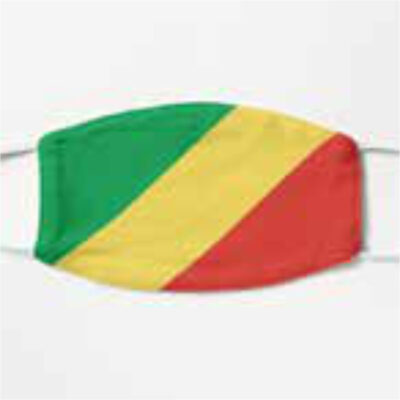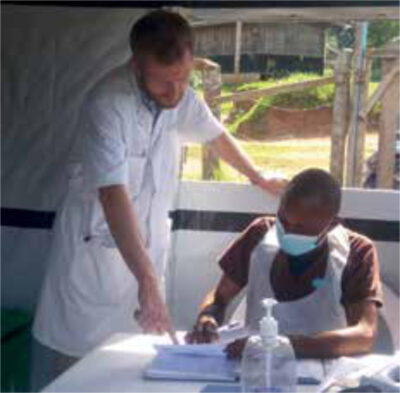Main content
It was in October 2019 that I received my first patient infected with Ebola. There is a first time for everything, but some things can better be avoided. Within a few days, I found myself alone in our house: my wife and our three children were temporarily elsewhere, as violence against Ebola response teams put the whole village in turmoil. Our 55-bed mission hospital in the Northeast of the DRC became almost empty with no outpatients anymore. Now, eight months later, we have no more Ebola in our area and I gladly use the experience that I acquired and apply it to the Covid-19 outbreak that is threatening us now.

In reality, every epidemic has its own characteristics, and I have learned to see differences and similarities. The mortality of Covid-19 in the DRC (2.2%) is much lower than for Ebola virus disease (EVD) during the epidemic in the area served by our hospital (66%).[1] Contact tracing and isolation of suspect cases, however, seems much easier for EVD than for Covid-19, since EVD hardly occurs without any symptoms. Vaccines are crucial in fighting against an outbreak, and the EVD vaccine possibly saved my life. Some epidemics gain more attention than others. For instance, few people know that the DRC had almost 370,000 measles cases and 6,779 deaths by measles in just the year 2019.[1] However, when I asked the Ebola surveillance team that was visiting our hospital on a daily basis in their 4x4s whether they had seen the measles-epidemic-Landcruisers, they grinned sheepishly.
There are also many similarities. In an outbreak it is crucial to inform all relevant parties and get them on board. If you forget to respect a village chief in the Congolese culture you will struggle to get anything done. Community resistance had massively hindered a thorough uptake of EVD cases, contact tracing and clinical management in our area.[2] So, when we saw the first few cases of Covid-19 in our region, we compiled small information sheets in French and Congolese Swahili about symptoms, prevention and the most important dos and don’ts. When bringing this to chiefs, government officials, church leaders and anyone interested, I found myself directly amidst good conversations, clarifying many things about Covid-19. Outbreaks often negatively impact continuity of care for other conditions, such as malaria and obstetric complications in affected areas, because of closure of health facilities, lack of staff or fear among patients to contract the disease in the facilities.[3] That is what we saw with the Ebola cases in our hospital, and that is what I also feared when Covid-19 would hit us. But luckily, with all Covid-19 measures in place now (borders, schools and churches closed, and meetings >20 people forbidden), hospital visits did not decline and villagers accepted the combined Ebola/Covid-19 triage at the gate knowing that it would help everyone.
I have yet to see the first Covid-19 case in our hospital. We feel at least a bit prepared with a triage and a small isolation unit, but we know that there are many things we cannot control. The Ebola epidemic brought us teams of experts in 4x4s and NGOs with water, sanitation and hygiene (WASH)-projects. Covid-19 brought us a provincial response protocol and many restrictions, but the government’s main focus has been on the highly urbanized area of Kinshasa, the country’s capital thousands of kilometres away, where cases augment rapidly. Our provincial health authorities designated hospitals without even an oxygen concentrator as Covid-19 treatment centres. Not a single hospital in our area can provide advanced respiratory support. We feel blessed with two oxygen concentrators powered by our hospital generator, but we are certainly highly underequipped compared to high- or middle-income settings. Unfortunately, most WHO and NGO experts have left the region.

Our area continues to be plagued by insecurity, and outbreaks add to these difficulties. I am learning resilience from my colleagues, some of whom have fled war zones or have been kidnapped or lost relatives and have learned to rebuild their lives after the loss of all their possessions. Our hope and our prayer is that this Covid-19 epidemic will make us stronger, as the Ebola epidemic did.
www.gzb.nl/ZorginCongo
Ebola is more of an open wound than a scar
References
- World Health Organization. Weekly bulletin on outbreaks and other emergencies [Internet]. Brazzaville: WHO Regional Office for Africa; 2020 May 31 (22): 19 p. Available from: https://apps.who.int/iris/bitstream/handle/10665/332246/OEW22-2531052020.pdf
- Nguyen VK. An epidemic of suspicion: Ebola and violence in the DRC [Internet]. N Engl J Med. 2019 Apr;380:1298-9. DOI: 10.1056/NEJMP1902682
- McQuilkin PA, Udhayashankar K, Niescierenko M, et al. Health-care access during the Ebola virus epidemic in Liberia. Am J Trop Med Hyg. 2017 Sep;97(3):931-6

















































